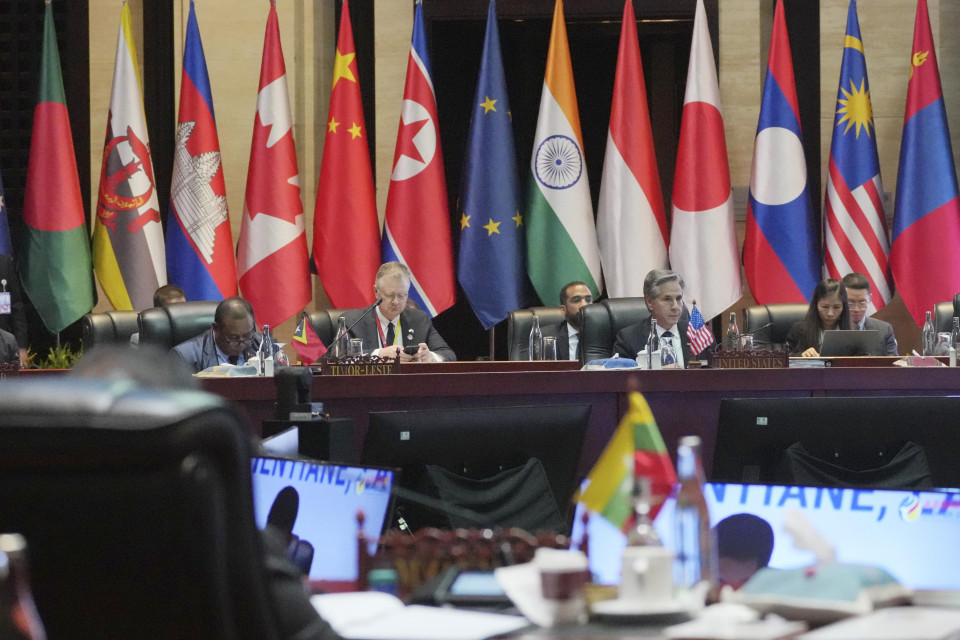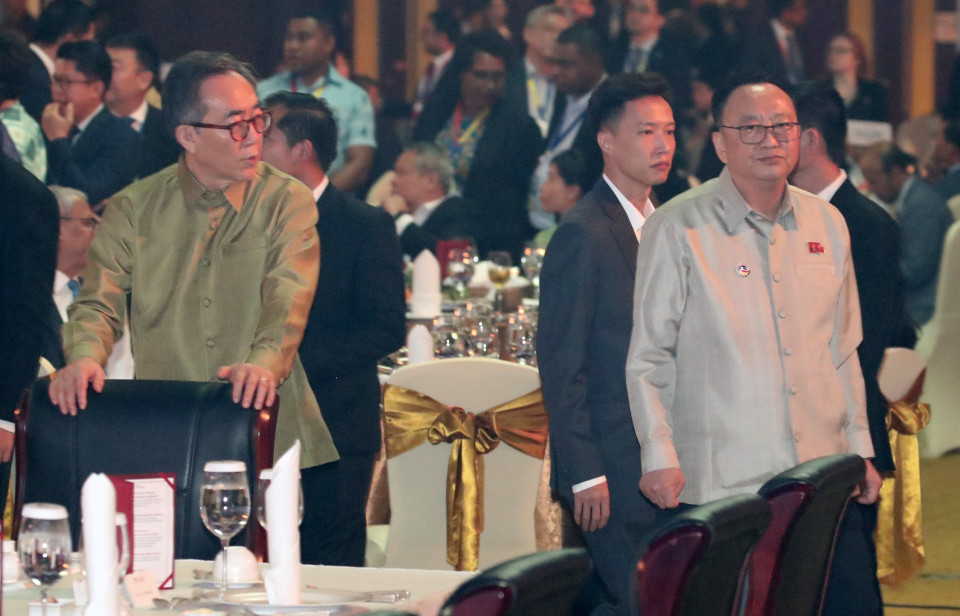Deep divisions among Asia-Pacific nations surfaced on Saturday as foreign ministers engaged in exchanges over Russia's protracted invasion of Ukraine and China's growing maritime assertiveness in nearby waters.
At the foreign ministerial gathering of the 18-member East Asia Summit, which includes ASEAN, Russia, China, the United States, Japan and South Korea, North Korea's missile and nuclear development was also discussed, the Japanese government said.
The meeting took place as tensions between the United States and its security allies and what they call autocratic countries, such as Russia, China and North Korea, have been escalating, sparking concerns that the world could be divided into two groups.

Japanese Foreign Minister Yoko Kamikawa, U.S. Secretary of State Antony Blinken, as well as Russian and Chinese foreign ministers, Sergey Lavrov and Wang Yi, attended the gathering on the final day of a series of ASEAN-related ministerial meetings from Sunday in Laos.
At the gathering, Kamikawa expressed "serious concerns" about military cooperation between Russia and North Korea, condemning Moscow's aggression against Ukraine as a "clear violation of the U.N. Charter," the government said.
Lavrov said following the meeting, "ASEAN countries do not want to enter into direct confrontation with the Americans and their allies," but they "see the threats associated with" NATO's penetration in the region, according to Russia's Tass news agency.
Even before launching a major attack against Ukraine in February 2022, Russia had voiced security concerns over NATO's expansion, with President Vladimir Putin demanding that the alliance pull back troops and weapons from Eastern Europe.
The Association of Southeast Asian Nations groups Brunei, Cambodia, Indonesia, Laos, Malaysia, Myanmar, the Philippines, Singapore, Thailand and Vietnam. The foreign ministers of all member states, except for military-ruled Myanmar, took part.
In response to Russia's war in Ukraine, the United States and other Group of Seven industrialized countries have imposed severe economic sanctions on Moscow. China has been deepening relations with Russia in recent years.
In the resource-rich South China Sea, some ASEAN members, particularly the Philippines, have become increasingly wary of Beijing's expanding military activities, with the ruling Communist Party claiming sovereignty over almost the entire area.
While Kamikawa said Japan is vigilant against China's military buildup in the sea, Wang criticized the United States during the gathering, saying, "If there is unrest in the region, it will be caused by outside intervention," according to a diplomatic source.
In June, Chinese vessels collided with several Philippine inflatable boats, resulting in a Filipino soldier losing a finger. Chinese ships have also used water cannons against Philippine vessels, leading to a deterioration of relations between the two countries.
Blinken denounced China for the incident, the source said. But the Chinese and Philippine foreign ministers agreed Friday to ease conflicts in the sea, a move welcomed by ASEAN members and other participants of the EAS meeting, the Japanese government said.
Meanwhile, Beijing has stepped up military provocations around Taiwan, saying the island is at "the core of China's core interests." China regards self-ruled democratic Taiwan as a renegade province to be reunified with the mainland, by force if necessary.
In the East China Sea, Japan and China have been at odds over the Tokyo-controlled, Beijing-claimed Senkaku Islands. Chinese coast guard vessels have repeatedly entered Japanese territorial waters around the uninhabited islets.
Later in the day, the 27-member ASEAN Regional Forum, known as one of the few multilateral events attended by a North Korean diplomat, was also held, as the Asian nation has been trying to bolster military ties with Russia.
North Korea, however, did not send Foreign Minister Choe Son Hui to this year's regional security gathering, with the ambassador to Laos representing the country instead.
At a dinner for attendees of the ASEAN-related meetings on Friday, South Korean Foreign Minister Cho Tae Yul attempted to shake hands with North Korea's ambassador but was refused, underscoring the rift between the two nations.

During the gatherings in the Laotian capital of Vientiane, some countries urged North Korea to make efforts to achieve complete, verifiable and irreversible denuclearization for regional peace and stability, the Japanese government said.
The EAS comprises ASEAN, Australia, China, India, Japan, New Zealand, Russia, South Korea and the United States. The ARF groups the EAS members plus Bangladesh, Canada, East Timor, Mongolia, North Korea, Pakistan, Papua New Guinea, Sri Lanka and the European Union.
Related coverage:
Japan, ASEAN top diplomats vow to boost security ties amid China rise
Japan, China top diplomats agree to deepen dialogue to solve disputes
Myanmar to send senior official to ASEAN meeting in Laos: sources
 By Tomoyuki Tachikawa,
By Tomoyuki Tachikawa,









